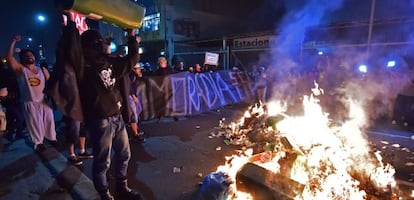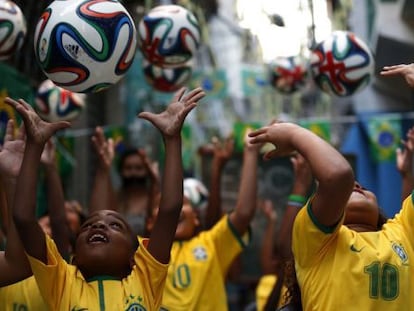Brazil anti-World Cup protests spread
Marches against hosting of tournament extend to 50 cities, with police expecting events to intensify

New protests against the 2014 World Cup erupted in Brazil on Thursday, when nearly 50 cities organized street marches just four weeks before the soccer tournament kicks off on June 12.
While these demonstrations were not comparable to the ones that shook the country’s main cities in June 2013, anger was still running high.
The anti-tournament sentiment adds to general unrest in Brazil over government corruption and widespread demand for more public investment in healthcare, education and public transport.
Brazilian authorities have also come under fire for what is being described as their poor organization of the event.
Everyone marched to the cry of “There will be no World Cup”
Social activists and workers’ movements joined the Thursday protests, aiming to profit from the global attention that Brazil is receiving as the host of the world’s most-watched soccer event.
While some groups of striking workers called for higher wages, left-wing parties such as Socialism and Freedom (PSOL) and the Unified Socialist Workers’ Party (PSTU) added volume to the marches.
In São Paulo, the country’s financial capital, protesting began at 5.30am as the Movement of Homeless Workers (MTST) demonstrated to demand more housing, and metal workers headed out on to the streets to clamor for better pay. Protestors blocked off a few avenues but no major incidents were reported.
But the tension grew significantly at 7.30pm local time when activists protesting the public expense of organizing the soccer tournament gathered on Paulista avenue, which was the main setting for the violent protests of last year.
We are going to see this movement grow throughout the coming weeks”
At that point the riot police intervened, using smoke bombs against protestors who were setting garbage bags on fire and destroying storefronts and car dealerships. Businesses quickly shut their doors, adding to the flow of people and the general confusion.
In São Paulo and Rio de Janeiro, teachers also went on strike, blocking several main thoroughfares. In the first city, education workers took their cue from an anti-World Cup event and started their own protest in the south of the city.
In Rio, a workers’ protest that began with around 3,000 marchers grew throughout the afternoon as students, bus drivers and public school teachers all joined in. Everyone marched to the cry of “Não vai ter Copa” (There’s not going to be a Cup).
The march was eventually broken up by a large police contingent.
“Police repression was enormous and brutal during last year’s demonstrations, and that is why we were afraid of going out today,” said Cyro García, president of PSTU. “But there are quite a few of us, and we are going to see this movement grow throughout the coming weeks and during the World Cup.”
In Pernambuco, a strike by military police ended in violence and the sacking of numerous businesses.
With 28 days left to go before the tournament begins, police intelligence services expect the protests to intensify, especially in the 12 cities that will host the matches.
More information








































